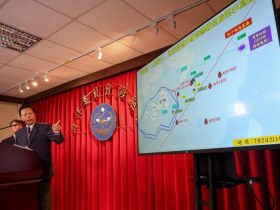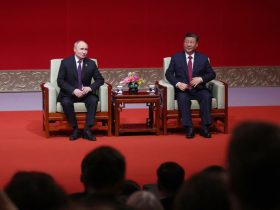China is cracking down on weather stations it says are spying for foreign countries, the latest measure in a broad counter-espionage campaign under leader Xi Jinping amid intensifying geopolitical tensions.
The country’s civilian spy agency, the Ministry of State Security, said Tuesday it had discovered hundreds of what it said were illegal meteorological stations with foreign links that were sending real-time weather data abroad – breaking data rules and posing national security risks.
The facilities were found across more than 20 provinces, and some of them were “directly funded by foreign governments,” the ministry said in a statement on social media.
Some stations were set up around sensitive sites such as military bases and defense companies to locate altitude and GPS data, the spy agency said. Others were placed in major grain-producing regions to analyze crop growth and grain yield, according to the ministry.
It noted that some of the devices were small, easy to install and hard to detect, and could automatically collect data and transmit over a network in real-time.
Some stations transmitted real-time information to official meteorological agencies overseas at high frequency and at multiple points for a long period of time, the statement said, adding they served foreign countries’ “homeland security” and meteorological monitoring.
The ministry did not say which foreign countries were involved.
The authorities made the discovery after investigating more than 10 overseas meteorological equipment agents and inspecting more than 3,000 foreign-linked meteorological stations nationwide.
The involved foreign parties did not obtain administrative licences for their activities, the spy agency said, and had not submitted the data to Chinese meteorological authorities or transmitted the data overseas with approval. The ministry said the activities violated both China’s data security law enacted in 2021 and a separate set of regulations on how foreign organizations can collect, use and share Chinese weather readings.
“Meteorological data… is an integral part of data security and resource security. It’s closely linked to military, food, and ecological security, climate change, and public interests,” the Ministry of State Security said. “The illegal collection and cross-border transmission of meteorological data endangers China’s sovereignty, security, and development interests.”
Weather balloons and air quality
The collection of meteorological data by foreign parties has previously sparked controversy with Chinese authorities.
In 2012, Beijing demanded foreign governments stop releasing data on China’s air quality, after the US Embassy’s documentation of Beijing’s choking smog drew widespread public attention inside China. The Embassy recorded hourly air quality data with an air sensor on its rooftop and posted it on Twitter, raising public awareness that pressured Chinese officials to acknowledge the scale of the problem and start taking measures to clean up the air.
The latest crackdown on foreign-linked weather stations comes eight months after the United States shot down a Chinese surveillance balloon that had meandered across the continental US and hovered over sensitive military sites. China maintained it was a “civilian airship used for research, mainly meteorological, purposes” that had veered off its planned course – and accused the US of overreacting.
Since then, Beijing and Washington have accused each other of spying in a string of highly public allegations. The two countries have long spied on each other but the deterioration in ties has supercharged this rivalry.
China’s Ministry of State Security has in recent months taken on a much more high profile role in publicizing multiple cases of alleged espionage by the US, claiming it has caught several spies working for the CIA and taking the rare step of giving some details.
The usually highly secretive agency, which oversees intelligence and counterintelligence both within China and overseas, does not even have a website.
But in August, it took the unprecedented step of launching a public account on WeChat, China’s hugely popular social messaging app that boasts more than 1 billion users. In the weeks since, the ministry has used the platform to repeatedly urge the public to stay vigilant and report suspicious activity to authorities.
The apparent propaganda blitz comes just weeks after CIA Director William Burns said his agency had “made progress” in rebuilding its spy network in China after suffering major setbacks a decade ago.






